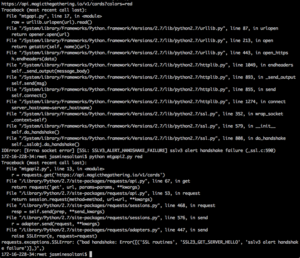Since there’s a Magic the Gathering API, I was hoping to continue working with card text this week, but in a more robust way. But, for some reason I kept getting a handshake error. I googled it, and people suggested using the request library, which I gather is somewhat more secure. I downloaded the libraries, and adjusted my code, but I still couldn’t get it to work:
$ pip install requests
$ pip install requests[security]
Instead, I worked with the encyclopedia of life API. Since I’ve been doing work with plants and algae for Temporary Expert, I thought the material might be interesting to work with. Also, I thought my phosphorus poem worked quite nicely and I was curious to experiment more with scientific texts in a poetic form.
The algae page didn’t lend itself well to text manipulation–none of the descriptions included were particularly interesting. After developing a general structure using the bees results, I then made a more general program where you can pass through any (land) animal as a parameter. I tried passing in other living things but it seems like not all results include the same fields, and so the program returns errors. This sort of makes sense to me given my experience looking at the algae results.
Reframing technical scientific naming and language is quite compelling to me. Something I think I’ve neglecting in the past few assignments is the form on the page (screen). The Hartley and Morris readings compelled me to pay more attention to this. While I didn’t address meter head on, it was interesting to see the difference including different length words made. I settled on a sort of round (visually) form which meant there were often short, stressed words at the beginning and end. Maybe this is bad.
I don’t understand feet.
My code and some experiments are on github. My first program and output are the ‘bees’ files. The final, more generalized program is eolapi.py and the experiments from this are saved as animals.txt.
